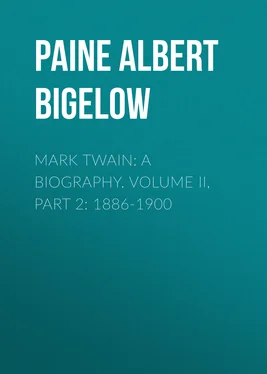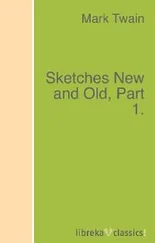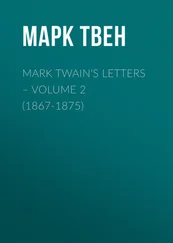Albert Paine - Mark Twain - A Biography. Volume II, Part 2 - 1886-1900
Здесь есть возможность читать онлайн «Albert Paine - Mark Twain - A Biography. Volume II, Part 2 - 1886-1900» — ознакомительный отрывок электронной книги совершенно бесплатно, а после прочтения отрывка купить полную версию. В некоторых случаях можно слушать аудио, скачать через торрент в формате fb2 и присутствует краткое содержание. Жанр: Биографии и Мемуары, foreign_antique, на английском языке. Описание произведения, (предисловие) а так же отзывы посетителей доступны на портале библиотеки ЛибКат.
- Название:Mark Twain: A Biography. Volume II, Part 2: 1886-1900
- Автор:
- Жанр:
- Год:неизвестен
- ISBN:нет данных
- Рейтинг книги:4 / 5. Голосов: 1
-
Избранное:Добавить в избранное
- Отзывы:
-
Ваша оценка:
- 80
- 1
- 2
- 3
- 4
- 5
Mark Twain: A Biography. Volume II, Part 2: 1886-1900: краткое содержание, описание и аннотация
Предлагаем к чтению аннотацию, описание, краткое содержание или предисловие (зависит от того, что написал сам автор книги «Mark Twain: A Biography. Volume II, Part 2: 1886-1900»). Если вы не нашли необходимую информацию о книге — напишите в комментариях, мы постараемся отыскать её.
Mark Twain: A Biography. Volume II, Part 2: 1886-1900 — читать онлайн ознакомительный отрывок
Ниже представлен текст книги, разбитый по страницам. Система сохранения места последней прочитанной страницы, позволяет с удобством читать онлайн бесплатно книгу «Mark Twain: A Biography. Volume II, Part 2: 1886-1900», без необходимости каждый раз заново искать на чём Вы остановились. Поставьте закладку, и сможете в любой момент перейти на страницу, на которой закончили чтение.
Интервал:
Закладка:
Clemens was in good standing at Washington during the Cleveland administration, and many letters came, asking him to use his influence with the President to obtain this or that favor. He always declined, though once—a few years later, in Europe—when he learned that Frank Mason, consul-general at Frankfort, was about to be displaced, Clemens, of his own accord, wrote to Baby Ruth Cleveland about it.
MY DEAR RUTH, I belong to the Mugwumps, and one of the most sacred rules of our order prevents us from asking favors of officials or recommending men to office, but there is no harm in writing a friendly letter to you and telling you that an infernal outrage is about to be committed by your father in turning out of office the best Consul I know (and I know a great many) just because he is a Republican and a Democrat wants his place.
He went on to recall Mason's high and honorable record, suggesting that Miss Ruth take the matter into her own hands. Then he said:
I can't send any message to the President, but the next time you have a talk with him concerning such matters I wish you would tell him about Captain Mason and what I think of a Government that so treats its efficient officials.
Just what form of appeal the small agent made is not recorded, but by and by Mark Twain received a tiny envelope, postmarked Washington, inclosing this note in President Cleveland's handwriting:
Miss Ruth Cleveland begs to acknowledge the receipt of Mr. Twain's letter and say that she took the liberty of reading it to the President, who desires her to thank Mr. Twain for her information, and to say to him that Captain Mason will not be disturbed in the Frankfort Consulate. The President also desires Miss Cleveland to say that if Mr. Twain knows of any other cases of this kind he will be greatly obliged if he will write him concerning them at his earliest convenience.
Clemens immensely admired Grover Cleveland, also his young wife, and his visits to Washington were not infrequent. Mrs. Clemens was not always able to accompany him, and he has told us how once (it was his first visit after the President's marriage) she put a little note in the pocket of his evening waistcoat, which he would be sure to find when dressing, warning him about his deportment. Being presented to Mrs. Cleveland, he handed her a card on which he had written "He didn't," and asked her to sign her name below those words. Mrs. Cleveland protested that she couldn't sign it unless she knew what it was he hadn't done; but he insisted, and she promised to sign if he would tell her immediately afterward all about it. She signed, and he handed her Mrs. Clemens's note, which was very brief. It said:
"Don't wear your arctics in the White House."
Mrs. Cleveland summoned a messenger and had the card she had signed mailed at once to Mrs. Clemens at Hartford.
He was not always so well provided against disaster. Once, without consulting his engagements, he agreed to assist Mrs. Cleveland at a dedication, only to find that he must write an apology later. In his letter he said:
I do not know how it is in the White House, but in this house of ours whenever the minor half of the administration tries to run itself without the help of the major half it gets aground.
He explained his position, and added:
I suppose the President often acts just like that; goes and makes an impossible promise, and you never find it out until it is next to impossible to break it up and set things straight again. Well, that is just our way exactly—one-half the administration always busy getting the family into trouble and the other half busy getting it out.
CLVXI
A "PLAYER" AND A MASTER OF ARTS
One morning early in January Clemens received the following note:
DALY'S THEATER, NEW YORK, January 2, 1888.
Mr. Augustin Daly will be very much pleased to have Mr. S. L. Clemens meet Mr. Booth, Mr. Barrett, and Mr. Palmer and a few friends at lunch on Friday next, January 6th (at one o'clock in Delmonico's), to discuss the formation of a new club which it is thought will claim your (sic) interest.
R. S. V. P.There were already in New York a variety of literary and artistic societies, such as The Kinsmen and Tile clubs, with which Clemens was more or less associated. It was proposed now to form a more comprehensive and pretentious organization—one that would include the various associated arts. The conception of this new club, which was to be called The Players, had grown out of a desire on the part of Edwin Booth to confer some enduring benefit upon the members of his profession. It had been discussed during a summer cruise on Mr. E. C. Benedict's steam-yacht by a little party which, besides the owner, consisted of Booth himself, Aldrich, Lawrence Barrett, William Bispham, and Laurence Hutton. Booth's original idea had been to endow some sort of an actors' home, but after due consideration this did not appear to be the best plan. Some one proposed a club, and Aldrich, with never-failing inspiration, suggested its name, The Players, which immediately impressed Booth and the others. It was then decided that members of all the kindred arts should be admitted, and this was the plan discussed and perfected at the Daly luncheon. The guests became charter members, and The Players became an incorporated fact early in January, 1888. —[Besides Mr. Booth himself, the charter members were: Lawrence Barrett, William Bispham, Samuel L. Clemens, Augustin Daly, Joseph F. Daly, John Drew, Henry Edwards, Laurence Hutton, Joseph Jefferson, John A. Lane, James Lewis, Brander Matthews, Stephen H. Olin, A. M. Palmer, and William T. Sherman.]—Booth purchased the fine old brownstone residence at 16 Gramercy Park, and had expensive alterations made under the directions of Stanford White to adapt it for club purposes. He bore the entire cost, furnished it from garret to cellar, gave it his books and pictures, his rare collections of every sort. Laurence Hutton, writing of it afterward, said:
And on the first Founder's Night, the 31st of December, 1888, he transferred it all to the association, a munificent gift; absolutely without parallel in its way. The pleasure it gave to Booth during the few remaining years of his life was very great. He made it his home. Next to his own immediate family it was his chief interest, care, and consolation. He nursed and petted it, as it nursed and petted and honored him. He died in it. And it is certainly his greatest monument.
There is no other club quite like The Players. The personality of Edwin Booth pervades it, and there is a spirit in its atmosphere not found in other large clubs—a spirit of unity, and ancient friendship, and mellowness which usually come only of small membership and long establishment. Mark Twain was always fond of The Players, and more than once made it his home. It is a true home, and its members are a genuine brotherhood.
It was in June, 1888, that Yale College conferred upon Samuel Clemens the degree of Master of Arts. It was his first honor of this kind, and he was proud of it. To Charles Hopkins ("Charley") Clark, who had been appointed to apprise him of the honor, he wrote:
I felt mighty proud of that degree; in fact I could squeeze the truth a little closer and say vain of it. And why shouldn't I be? I am the only literary animal of my particular subspecies who has ever been given a degree by any college in any age of the world as far as I know.
To which Clark answered:
MY DEAR FRIEND, You are "the only literary animal of your particular subspecies" in existence, and you've no cause for humility in the fact. Yale has done herself at least as much credit as she has done you, and "don't you forget it."
C. H. C.Clemens could not attend the alumni dinner, being at Elmira and unable to get away, but in an address he made at Yale College later in the year he thus freely expressed himself:
Читать дальшеИнтервал:
Закладка:
Похожие книги на «Mark Twain: A Biography. Volume II, Part 2: 1886-1900»
Представляем Вашему вниманию похожие книги на «Mark Twain: A Biography. Volume II, Part 2: 1886-1900» списком для выбора. Мы отобрали схожую по названию и смыслу литературу в надежде предоставить читателям больше вариантов отыскать новые, интересные, ещё непрочитанные произведения.
Обсуждение, отзывы о книге «Mark Twain: A Biography. Volume II, Part 2: 1886-1900» и просто собственные мнения читателей. Оставьте ваши комментарии, напишите, что Вы думаете о произведении, его смысле или главных героях. Укажите что конкретно понравилось, а что нет, и почему Вы так считаете.












